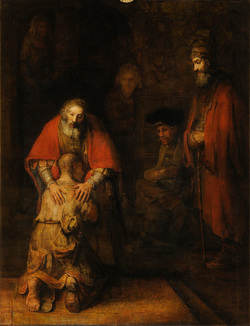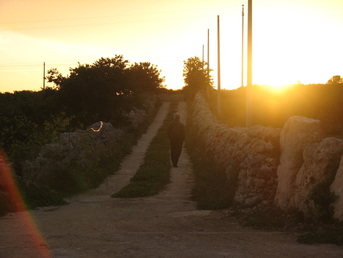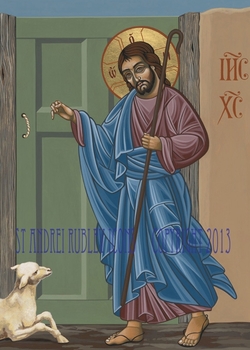 This week marks the middle of Lent, more or less. Hopefully our Lenten sacrifices and works are bearing fruit, though some of us may be feeling like we are stumbling around in the dark, unable to see where we are going on this journey. The efforts of some might have become habitual, but others of us might feel like we are at a standstill, unable to see that there has been any movement so far, thinking that our efforts have not really made much difference in our lives or the lives of others. But what we need to keep in mind is that the journey is far from over and that we are not alone. We have entered into Lent with Jesus and with the community, so there nothing to fear. Jesus is continually inviting us to enter into the banquet of His mercy and forgiveness, a never-ending gift offered to us in many ways. What is important is that we do not take this invitation for granted, nor should we stop trusting the power of our own efforts and prayer, which not only affect us, but affect the entire Body of Christ. Even if we cannot see the results, we need to trust that God is with us, offering us grace to keep up our efforts at working toward holiness and wholeness. As part of my Lenten reflection I have been praying with selections from the book, “Crossing the Threshold of Mercy,” which is a compilation of quotes mostly from the writing and homilies of Pope Francis. One quote that caught my attention is appropriate to the gospel for this weekend which is from Luke 15, the Parable of the Lost Son, (sometimes referred to as the Prodigal Son.) Pope Francis wrote, “Let us never tire of also going out to the other son who stands outside, incapable of rejoicing, in order to explain to him that his judgment is severe and unjust and meaningless in light of the father’s boundless mercy.” This reminds me that we must notice there is a son missing from the party before we can even begin to try offering such an invitation. The only way to do that is to pray that our eyes be opened as to who among us is alienated by their own choice or by our lack of welcome.  To put this into the perspective of this rather well-known Gospel, there were two sons who sinned against their father. The first had disrespected everything about family and love by demanding his inheritance immediately and then in living a life of dissipation, squandered it all. But in his heart, he knew his father to be merciful, so eventually he returned in great humility and shame to the father who indeed rejoiced at the return of this young son. The older son also disrespected family and love, because in the resentment he harbored against his brother, he revealed a further resentment against the boundless mercy and goodness of his father who forgave his wayward brother. He would not forgive his brother, nor would he acknowledge that the riches of his father’s mercy had always been extended to him. He could not see that he literally resided in a family in which love, mercy, and total giving were always present. Instead, he refused the same mercy offered to his brother now being offered to him when his father left the party in order to beg him to enter into his joy. The parable never tells us what that older brother chose. Jesus has left it up to the ‘listener’ to decide how to write the ending, so to speak, and therefore left the challenge for us as well: are we like the older brother who refused to enter into the banquet? Do we resent others who have been gifted in some way and who in our judgment do not deserve it? This is important for us as we examine our conscience to see if we have failed to enter into the invitation of God to let go of resentments or to be reconciled with others in any way. But there is a deeper challenge, which we can see only if we take the perspective not of the brothers or the father, but rather of one of the party-goers who is celebrating the return of the young son. This viewpoint asks us if we have noticed that there is a lack of wholeness in the body of people inside the party. It asks if we have even missed the older brother. It also asks us to find out why that older brother is choosing to stand alone in the night. This is at the heart of what Pope Francis has written.  In taking on the perspective of a party-goer we must recognize that there is a lack of wholeness in the community because of those standing outside of the banquet. This implies that we have work to do in order to invite those who are missing to enter into our joy. We have to notice their absence in order to begin the process of inviting them in. Once we have done that, we can begin our efforts at invitation and welcoming. Invitation is not about proselytizing, but rather it is about evangelizing. To proselytize is to give the ‘hard sell’, as one would recruit a follower to a cause. To evangelize is to let both our actions and our words speak the gospel message in order that the Word itself would work inside the receiver’s heart. It is a way of modeling the values we have learned from Jesus, but is not about arguing or ‘beating people over the head with our bibles.’ True evangelization is about living the gospel as best we can, offering love and mercy to others as Jesus would have us do. Therefore, we take to heart what Jesus taught in Matthew 25 when He indicated that we need to welcome the stranger. While this can refer to the alien or foreigner in our land (to use the plea repeated throughout the Old Testament), the stranger is anyone who is regarded as ‘different,’ or an outsider, whether they have chosen that position or not. That actually describes each one of us since we all have experienced being ‘on the outside looking in’ at some point in our lives. We do know the feeling. Like the older brother, some might refuse to enter in because they are angry over some past wound, or because they do not understand the way of mercy. There are some who will refuse to act with respect and who will refuse to see that they have always had the love and mercy of the Father. These might scoff at our faith, at our attempts at doing good works, at our participation in a church family, and at our attempts at reaching out to them. We cannot force anyone to accept gifts any more than the Father forces us to accept His. Part of acting in mercy is to allow the other one the freedom to accept or reject our offer. But even more important is that we allow them the freedom to reject it without holding a grudge against them or judging them poorly. If we were to judge, we would be just like them: holding onto resentment and fear. With these we can only offer kindness and charity, hoping that our good works and the joy of being within the banquet might eventually allow them to cast aside their resentment and enter in. That means, as the Pope suggests, that we must never tire of reaching out to those who are like that older son. Jesus never stops inviting us into His mercy, so we need to ask Him to give us the grace to never stop inviting others into it as well.  If we want those on the outside to let go of their refusal to enter we must continue to keep the welcome mat out and the door open. We do this through our efforts at personal wholeness asking for healing of our own sinfulness through the grace of God, (that is, to become holy), so that we can become able to invite others into the Kingdom. Then we can begin to look past ourselves and learn to see that someone is in pain and is missing from the banquet. Only then can we begin to have the attitude of mercy of the Father, which is to never stop working at inviting the one outside into the banquet. Let us trust in the grace of the Holy Spirit that we might continue to grow in holiness, that we may continue to immerse ourselves in the Passion of Christ, that we may learn to notice who is in need of invitation, and that we might work toward building the Kingdom into completion by sharing the mercy and love we have received. May we pray for our eyes to be opened to the one standing outside in the darkness! May we not fear to enter into the darkness to invite the one outside into the light! May we persevere in our Lenten efforts no matter how we feel about the quality of the journey thus far, trusting in the mercy of God who knows the intention of our hearts! May we open our arms to those who are struggling to let go of all that keeps them from mercy and love! May we be freed from all judgment of those who will not enter into the banquet of mercy! And may we never cease in our efforts to grow in holiness because in so doing, we are indeed building up the Kingdom of God! Let us continue to meet in the Heart of Jesus! Peace! ©Michele L. Catanese The first photo is one of mine. It is of an active Catholic parish in Medora, North Dakota. I chose this photo because this small, humble parish was alive with people and subsequently with worship. Our church families are those who gather at the banquet to which we are all invited. We are united as members of the community, the Body of Christ. The next image is the famous Rembrandt painting, The Return of the Prodigal Son. Next is another of my photos. It was taken at a farmhouse near Noto, Sicily. I chose this one because the figure seems to be walking away from the house, where the banquet is being held, symbolic of the older brother. Last is an icon by Fr. William Hart McNichols called El Buen Pastor. I chose this because sometimes the one trying to get into the house is the Lord Himself. We cannot get so carried away with our merry-making that we forget Him and subsequently leave Him outside. Therefore we must always be attentive to our guests, those who are inside the house, as well as the ones who we are trying to invite in. This icon can be found at http://frbillmcnichols-sacredimages.com/featured/el-buen-pastor-188-william-hart-mcnichols.html
Carmella Wygant
3/8/2016 09:47:42 am
I thank God for your willingness to be a conduit for God's love and relentless mercy for all of his children. I thank God for the gentle reminder that my judgment of others is exactly as Pope Francis observes. Comments are closed.
|
Heart Speaks to Heart
|

 RSS Feed
RSS Feed

